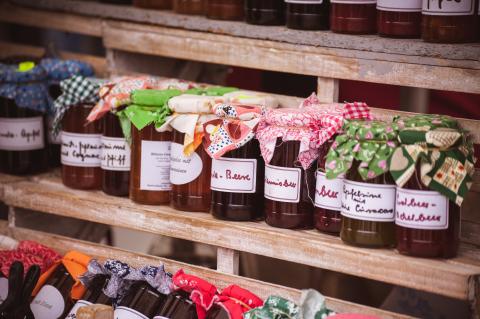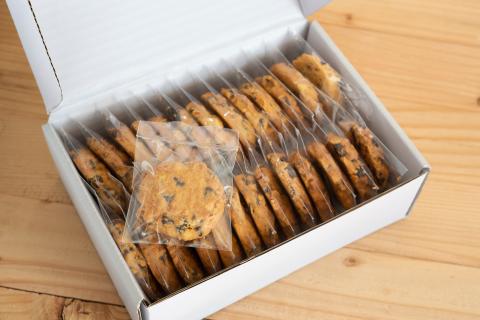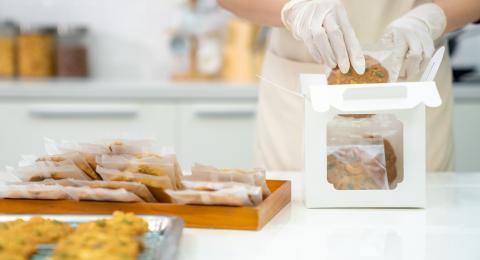When is a Class H Homestead License Required (Non- Exempt)
Starting a homestead food business is a dream of many home cooks. Beginning small, in your primary home kitchen, with shelf-stable baked goods and other approved foods is a practical way to try out this venture.
There are some food safety and legal requirements that will help to create a delicious and safe product. This fact sheet series, developed from New Hampshire Food Protection Section guidance, can help to get you started. Reading all the fact sheets will give you the best start with the information you need to start and grow your food business.
There are 15 cities and towns in New Hampshire that are self-inspecting jurisdictions and may require additional requirements for Homestead licensing or don’t allow homestead operations. See the resource section for a link to a listing of the cities and towns.
You may be surprised at the variety of foods that are allowed to be made in your home kitchen. The same foods are allowed whether exempt from a Homestead license or with the Homestead Class H license. Depending on which markets you are selling to, a Class H license for your home kitchen may be required.
A New Hampshire Class H Homestead License is required if you wish to sell your non-TCS foods (safe at room temperature storage) products:
- To restaurants
- To food establishments (not including retail food stores - for these, no license is needed to sell homestead foods)
- Over the internet
- By mail order
- To wholesalers, brokers, or other food distributors
AND you must meet the licensing requirements for a Class H Homestead license, which has a fee of $150.
Restrictions
Under a homestead license, you are not allowed to offer potentially hazardous food that requires refrigeration for safety.

1. What must I submit with my license application?
- Water test results for bacteria, nitrates and nitrites if using well water. Not required if using municipal water.
- All Process Review results for any processed or jarred foods such as BBQ, hot sauces, mustards, pepper jellies, and non-National Center for Home Food recipes for jam, jellies, pickles, salsa, and relishes. Laboratory results (pH and water activity) for homemade buttercream or cream cheese frostings.
- Water activity results for any baked goods made with banana, pumpkin, zucchini or other fruit or vegetable.
- List of products you are selling.
- Copy of a sample of finished product labels.
Important Information:
A process review is required if you use your own jam, jelly, acid foods (vinegars, mustards, BBQ sauces), or acidified food recipe or “tweak” a recipe found on the National Center for Home Food Preservation website.
Process reviews are required for processed or jarred foods using your own recipe and not the exact recipe, jars, or process from the National Center for Home Food Preservation. The food processing authority declares in writing whether there are biological food safety concerns with the food. Food products that have a pH below 4.6 or a water activity below 0.85 can be produced in the homestead.
A list of food processing authorities is available from the New Hampshire Food Protection website on food processing https://www.dhhs.nh.gov/programs-services/environmental-health-and-you/food-protection/food-processing-plants in the Frequently Asked Questions (FAQ) section.

2. What Kinds of Foods Can I Sell with a Homestead Food License?
The homestead license applies to non-potentially hazardous foods made in the residential kitchen of the homestead food operation. (For a sample listing see: The Basics - Part One or contact NH Food Protection https://www.dhhs.nh.gov/programs-services/environmental-health-and-you/food-protection) to determine if your product is allowed.
Under a homestead license, you are not allowed to offer food that requires refrigeration for safety or beverages such as Kombucha or Cold Brew Coffee as these require a beverage license.
Note:
Kombucha cannot be made under the Homestead Act; making it for sale requires a beverage license if the alcohol content is .5% or less. Over that limit, a liquor license is required.
3. How must I label my Homestead Products?
You are required to label your individually packaged products with the following information:
a. Name, physical address, and phone number of the homestead food operation
b. Name of the homestead food product
c. The ingredients and sub-ingredients of the homestead product, in descending order by weight
d. The name of each major food allergen contained in the food unless it is already part of the common or usual name of the respective ingredient already disclosed in the ingredient statement.
Major food allergens:
- Milk
- Eggs
- Fish (e.g., bass, flounder, cod)
- Crustacean shellfish (e.g., crab, lobster, shrimp)
- Tree nuts (e.g., almonds, walnuts, pecans, coconut)
- Peanuts
- Wheat
- Soybeans
- Sesame seeds
e. The label must also state in at least 10-point font “This product is made in a residential kitchen licensed by NH DHHS.”
f. Product code which identifies the product with a batch number. Note: this number can be your “baked on” date and “batch number”. For example: 1012-2 for the second batch of cookies made on October 12.
Example Label from NH DHHS Homestead Food Operations:

Chocolate Chip Cookies
Batch 1012-2
Ashley’s Cookies
2550 Kingston Lane
Anytown, NH 03333
(603)-555-5555
Ingredients: Enriched flour (Wheat flour, niacin, reduced iron, thiamine mononitrate, riboflavin and folic acid), butter (milk, salt), chocolate chips (sugar, chocolate liquor, cocoa butter, butterfat (milk), eggs, soy lecithin (as an emulsifier), walnuts, sugar.
Contains: wheat, eggs, milk, soy, walnuts
This product is exempt from New Hampshire licensing and inspection.
4. What equipment and procedures must I have in my residential home kitchen?
- Either a residential model dishwasher and a one compartment sink OR a two-compartment sink to wash, rinse and sanitize your utensils.
- A home refrigerator with a thermometer. Refrigerator temperature maintained at 41°F or less.
- No pets in the kitchen during food preparation and packaging.
- If the bathroom opens directly to the kitchen, it must have a self-closing door and mechanical ventilation.
For More Information:
For More Information:
NH DHHS Food Protection dhhs.foodprotection@dhhs.nh.gov, 603-271-4589
https://www.dhhs.nh.gov/programs-services/environmental-health-and-you/food-protection
Homestead Food Operations
https://www.dhhs.nh.gov/programs-services/environmental-health-and-you/food-protection/homestead-food-operations
Food Processing Including Licensing, Food Processing Authorities, and Frequently Asked Questions
https://www.dhhs.nh.gov/programs-services/environmental-health-and-you/food-protection/food-processing-plants
New Hampshire He-P 2300 Sanitary Production and Distribution of Food
http://www.gencourt.state.nh.us/rules/state_agencies/he-p2300.html
NH Liquor Commission (for kombucha)
https://www.nh.gov/liquor/enforcement/contact-us/index.htm
NH Self-Inspecting Cities & Towns
https://www.dhhs.nh.gov/sites/g/files/ehbemt476/files/documents/2021-11/fp-selfinspect.pdf
NH DHHS Food Protection Beverage Licensing (i.e., Cold brew coffee)
https://www.dhhs.nh.gov/programs-services/environmental-health-and-you/food-protection/beverage-bottled-water-manufacturers
This work is supported by the Expanding the Reach of New Hampshire's Food Safety Education and FSMA Programs to Include Value Added Processors program, project award number 2018-70020-28876, from the U.S. Department of Agriculture’s National Institute of Food and Agriculture. Any opinions, findings, conclusions, or recommendations expressed in this publication are those of the author(s) and should not be construed to represent any official USDA or U.S. Government determination or policy.
Created: January 2023
Updated: January 2025
Special appreciation to Royann Bossidy of the NH Food Protection Section for her insights and guidance in putting together this fact sheet series.


